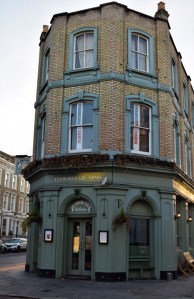Review: The Melting Pot (Finborough Theatre)
It is the first time that Israel Zangwill’s 1908 drama has been seen on these shores in 70 years
They came in their millions. As the 19th century drew to a close, America opened its doors. Immigrants from across Europe and beyond arrived in the States seeking a fresh start. Israel Zangwill‘s 1908 drama, not seen on these shores for 70 years, contrasts the utopian optimism of multiculturalism with the latent tensions lying in wait. There is, it implies, no such thing as a whole new world.
Max Elton’s revival, at a moment when an isolationist president is tightening borders and stoking xenophobia, offers it as both a shot of idealism and a dose of reality. Born in Britain to Russian parents, Zangwill wasn’t the first to use the phrase 'melting pot', but his play did much to popularise it. "America is God’s crucible", beams the newly-arrived Russian Jew David Quixano (Steffan Cennydd), "The great melting pot where the nations of Europe are melting and reforming".
A talented musician, David is composing a new American symphony – symbolically unfinished – to express the pain that immigrants left behind and their hope for the future. A radical new sound that impresses the legendary German conductor Herr Pappelmeister (Hayward B Morse), it uses orchestral harmonies to express David’s belief in "the fusion of all races" on American soil.
This was, don’t forget, a moment when the nations of Europe were turning against one another, as empires strained to hold off their ends. America promised a fresh start, free from history, but Zangwill stresses that people bring their pasts with them. His America is many things to many people. David and his Yiddish-speaking grandmother might have fled the persecution of the pogroms, but others, the aristocratic Baron Revendal (Peter Marinker) for example, made the journey to be free of problems they blame on the Jewish population. His daughter Vera (Whoopie van Raam) offers a way forward. A revolutionary on the run, she overcomes an anti-semitic upbringing to support and even love David.
In fact, America has anti-semites of its own, including Pappelmeister’s patron, Quincy Davenport (Alexander Gatehouse makes a charming snake). Whether out of jealousy over Vera – healthy, American competition – or his own ingrained anti-semitism, he bans the orchestra from playing the symphony. It’s telling that an old pogrom injury prevents David from playing the violin for his living.
Staged in a room walled with burnished mirrors, as if people’s judgement are clouded, Elton’s production plays out on a carpet of stars-and-stripes bleeding into one another; an image that’s both optimistic and ominous at the same time.
That’s more than can be said for Zangwill’s play and, for all its historical intrigue, there are good reasons why it’s gone unproduced so long. It’s surprisingly modern in its thinking and its symbolism, but its action is flatly predictable and, so, melodramatic. The tensions of a nation are squished into the living room dramas of a single social set.
Admirable though its rediscovery is, Elton’s shoestring staging doesn’t make a case for reviving it beyond sprinkling a little historical context on present-tense politics. His cast are likeable and spritely, but their performances all lack psychological detail and constraints strip out any aspirations towards authenticity. Zangwill’s play, as rooted in its time as it is relevant to our own, needs it.
The Melting Pot runs at the Finborough Theatre until 19 December.
















